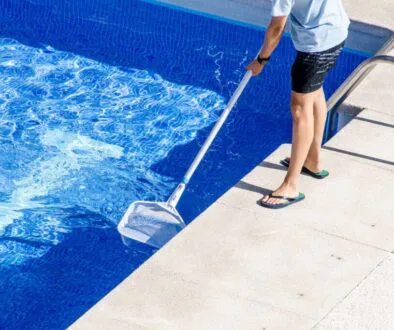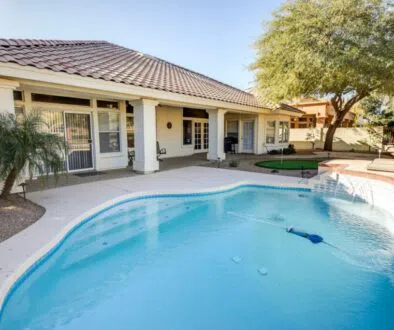How to Treat High Alkalinity in Pool? A Step-by-Step Guide
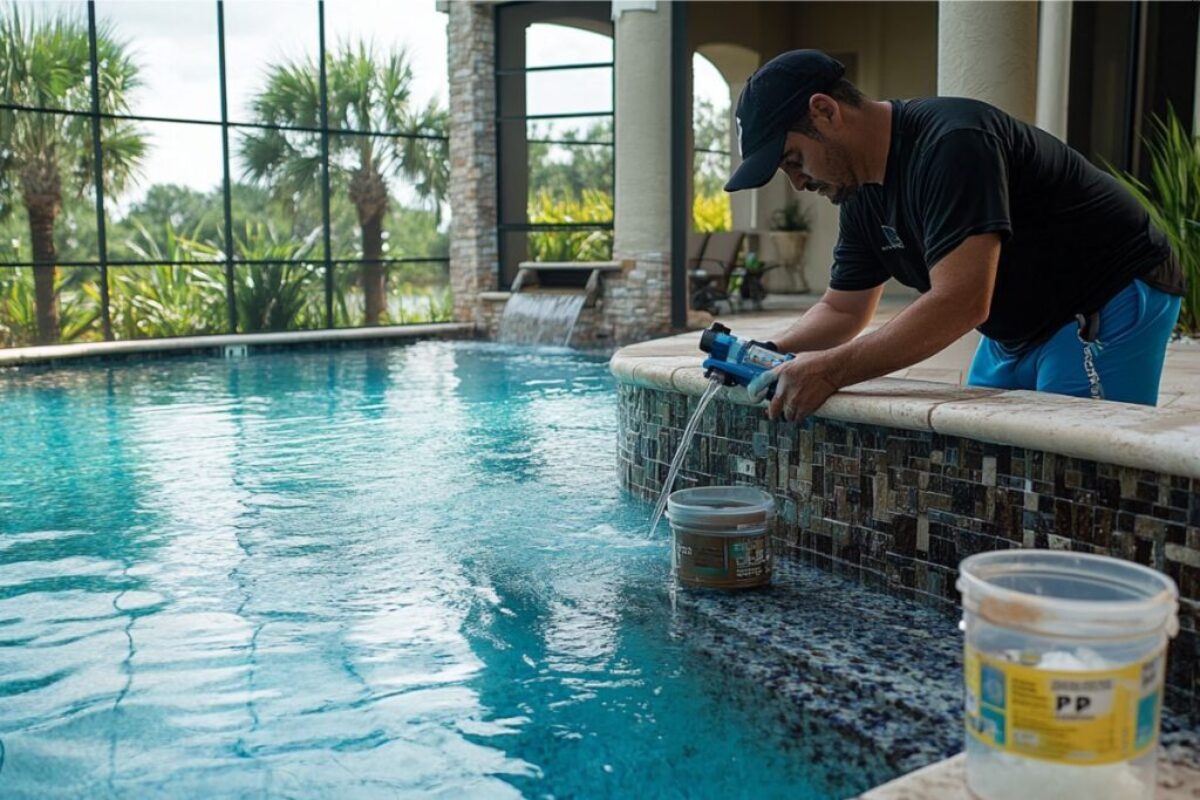
Published November 8, 2024
High alkalinity in your pool can cause many problems, like cloudy water and irritated skin. It also makes it harder for chlorine to keep your pool clean. Balancing alkalinity is key to having safe and sparkling water. This guide will teach you easy steps to lower high alkalinity levels. With a few simple tools, you can keep your pool healthy and ready for swimming all season.
What is Pool Alkalinity, and Why Does It Matter?
Understanding alkalinity is key to keeping pool water safe and clean. Think of alkalinity as the “pH stabilizer” in your pool. It prevents drastic pH swings that can damage equipment and make swimming uncomfortable. When alkalinity is too high, pH levels can also rise, making the water cloudy and less effective at killing bacteria.
Alkalinity between 80 and 120 ppm is ideal for a balanced pool. However, once it spikes above this range, action is needed to prevent issues like calcium buildup, cloudy water, and skin irritation.
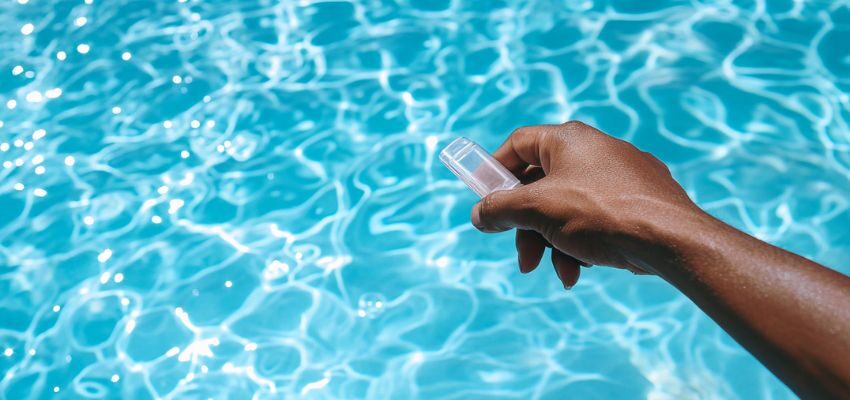
Symptoms of High Alkalinity
High alkalinity is like a red flag for other pool problems. If you’ve noticed cloudy water, rough pool surfaces, or a clogged filter, high alkalinity might be the cause. Not only does it disrupt water clarity, but it also limits chlorine’s effectiveness, allowing bacteria and algae to thrive. Many pool owners first spot high alkalinity due to water cloudiness or discomfort during swimming.
One real-life example is common during pool season. A family notices their pool water turning cloudy just days after their last cleaning. This is often due to increased alkalinity after using certain pool chemicals.
Step-By-Step Guide on How to Treat High Alkalinity in a Pool
1. Test the Alkalinity and pH Levels
Start with a reliable test kit. Testing alkalinity and pH will show you exactly how high the levels are. Aim for alkalinity between 80 and 120 ppm and a pH of 7.2 to 7.8.
If levels are high, write down the measurements. High readings mean it’s time to introduce an acid, like muriatic acid or sodium bisulfate, to lower alkalinity safely. This guide explains how to raise or lower alkalinity in your pool in more detail.
2. Choose Your Acid: Muriatic Acid or Sodium Bisulfate
Both muriatic acid and sodium bisulfate are effective at reducing high alkalinity. Muriatic acid is powerful and fast-acting but requires careful handling. Sodium bisulfate, or dry acid, is safer to handle and slower-acting. Both will lower alkalinity, but sodium bisulfate is a gentler alternative if you’re cautious about using strong chemicals around the pool.
For example, imagine a pool owner named Jane. She has kids who love to swim daily, so she chooses sodium bisulfate to avoid handling strong acids. This approach allows her to treat the pool safely and gradually.
3. Prepare and Add the Acid Safely
Before adding the acid, turn off the pool pump and wait until the water remains. Then, slowly add the acid to the deep end.
For muriatic acid:
- Dilute it with water before adding (check the label for exact ratios).
- Wear protective gear like gloves and goggles.
- Pour it slowly in small amounts, moving around the pool for even distribution.
For sodium bisulfate:
- Dissolve it in a bucket of water.
- Pour the solution around the pool’s edges for a uniform spread.
Once you’ve added the acid, turn on the pool pump and let it run for 5-6 hours to circulate.
4. Wait and Retest
Wait about 24 hours before testing the alkalinity and pH again. This waiting period lets the acid settle in and adjust the levels naturally. Check if the alkalinity is safe (80-120 ppm). If it’s still high, you may need to repeat the process.
5. Consider Natural Adjustments: Aeration
For those who prefer a non-chemical approach, aeration can help adjust pH levels without lowering alkalinity. Aeration involves adding air to the water using a fountain waterfall or letting kids play around in the water. Aerating the pool raises pH without affecting alkalinity levels.
Excel Pools Boca Raton offers various pool maintenance services, including aeration setups, that keep your pool clear without heavy chemical use. Excel Pools Boca Raton offers expert cleaning and treatment services for additional professional pool care.
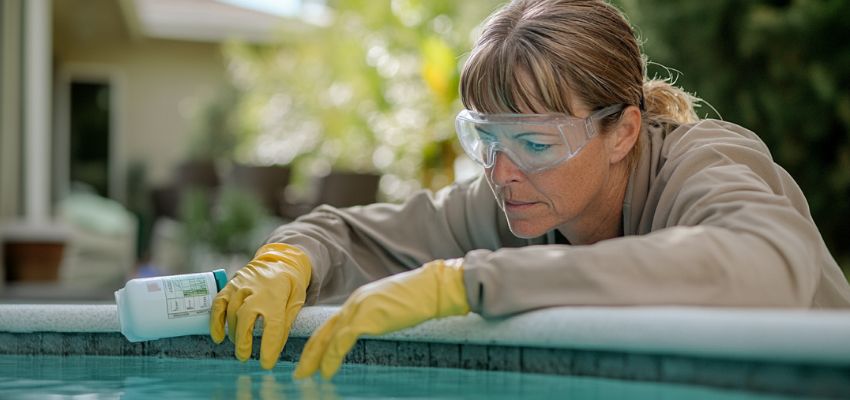
Risks of High Alkalinity
Ignoring high alkalinity can lead to costly problems. Calcium buildup damages filters, walls, and circulation systems, leading to expensive repairs. High pH also irritates skin and eyes, making swimming uncomfortable and reducing chlorine effectiveness.
For example, a homeowner may notice white, rough patches forming on pool surfaces. This is calcium scaling, a direct result of untreated high alkalinity. Fixing these surfaces can be pricey, so regular monitoring and adjustment are essential.
FAQ Section
How do I treat high alkalinity in a pool without chemicals?
Like a fountain or waterfall, aeration techniques raise pH without altering alkalinity. They are slower but effective.
Can I use baking soda to lower alkalinity?
No, baking soda raises alkalinity. It’s used to increase low alkalinity levels, not lower high ones.
Is it safe to swim with high alkalinity?
While it’s possible to swim, high alkalinity may cause skin irritation and cloudy water. It’s best to address it promptly.
How often should I test alkalinity levels?
Test weekly during peak swimming season and monthly during off-seasons to ensure balanced water.
What’s the quickest way to lower alkalinity?
Using muriatic acid is fast but requires careful handling. Sodium bisulfate is slower but easier to handle.
Final Thoughts
Maintaining the right alkalinity is essential for a safe, enjoyable swimming experience. Regularly testing and adjusting alkalinity levels keeps your pool clear, protects equipment, and prevents irritation. For those seeking a professional touch, Excel Pools Boca Raton offers reliable services tailored to pool health and maintenance. Treating high alkalinity doesn’t need to be a headache—just a little routine care and attention!
Hire Boca’s Favorite Pool Builders
Excel Pool and Patio Solutions is your trustworthy provider of pool services in Boca Raton. We are experts in pool and patio remodeling and can handle your resurfacing needs as well. Our technicians are vetted and trained for your guaranteed satisfaction. Get to know us by browsing our website or reaching out to us with any questions.
Contact our team today to request a free estimate for pool construction, maintenance, repairs and more.
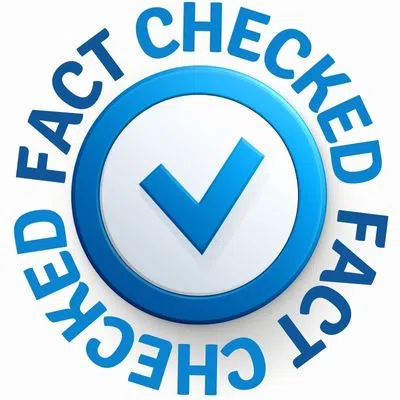
Fact Checked By Experts
This is original content and has been diligently fact checked by our internal team of experts. Discover more about the rigorous editorial standards we uphold for our website here.

About The Author
Hello! I am Corinne, a graduate of Riverside College. My career has evolved into focusing on writing, where I deliver high-quality and meticulously researched content. I have a proven track record of developing helpful articles that engage a wide variety of readers.

